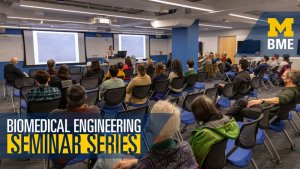Presented By: Biomedical Engineering
Biomedical Engineering Seminar Series
"Intelligent and Accessible Sensing and Neurotechnology Platforms for Next-Generation Medicine," with Majid Aalizadeh, Ph.D.

Intelligent and Accessible Sensing and Neurotechnology Platforms for Next-Generation Medicine
Abstract:
Despite major advances in consumer electronics such as smartphones, modern healthcare systems still lag behind in accessibility, sophistication, and data integration. For much of the global population, medical and their analytical tools remain far less advanced than the technologies used in daily life. To bridge this gap between everyday devices and medical innovation, my research centers on three major themes: First, I will present the development of a low-cost, point-of-care automated diagnostic platform that enables multiplexed biochemical testing with an order-of-magnitude reduction in cost compared to currently available commercial platforms. Second, I will discuss machine learning-enhanced biosensing for cancer diagnostics, where our recent work demonstrates thousand-fold precision improvements through full-spectrum and multi-resonance modeling compared to conventional one-dimensional fittings. Finally, I will introduce hybrid dynamic optogenetic–electrophysiology neural interfaces, combining metasurface-based beam steering with minimally invasive carbon-fiber arrays for adaptive and chronic closed-loop neuromodulation.
Abstract:
Despite major advances in consumer electronics such as smartphones, modern healthcare systems still lag behind in accessibility, sophistication, and data integration. For much of the global population, medical and their analytical tools remain far less advanced than the technologies used in daily life. To bridge this gap between everyday devices and medical innovation, my research centers on three major themes: First, I will present the development of a low-cost, point-of-care automated diagnostic platform that enables multiplexed biochemical testing with an order-of-magnitude reduction in cost compared to currently available commercial platforms. Second, I will discuss machine learning-enhanced biosensing for cancer diagnostics, where our recent work demonstrates thousand-fold precision improvements through full-spectrum and multi-resonance modeling compared to conventional one-dimensional fittings. Finally, I will introduce hybrid dynamic optogenetic–electrophysiology neural interfaces, combining metasurface-based beam steering with minimally invasive carbon-fiber arrays for adaptive and chronic closed-loop neuromodulation.